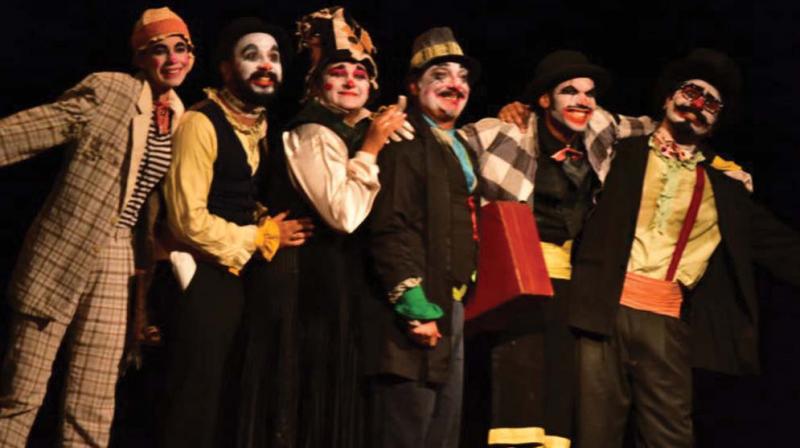Something wicked this way comes: Clowning around with Macbeth

“Life’s but a walking shadow, a poor player that struts and frets his hour upon the stage and then is heard no more.” The tale of the ill-fated Thane of Cawdor has been revered by the world over for centuries, as one of the greatest tragedies ever written. Acclaimed filmmaker Rajat Kapoor finds a whole new side to the tragic hero: comedy and The Natak Company is bringing it back to the city. “Shakespeare is a minefield of human emotions and that has kept it going for centuries,” says Kapoor. As a bunch of clowns attempt to find their version of this much-told tale, we find that beneath it all, universality is the basis of the human experience.
Kapoor’s rendezvous with clowns goes back to 1999 with the opening of his play ‘C for Clown’. “That was a completely improvised play and it ran successfully for 10 years,” he says. Somewhere along the way, Kapoor thought to himself, “What if clowns were to interpret classical text? It was very exciting and so we did Hamlet, our first Shakespeare play in 2008.” Hamlet-the Clown Prince began as an experiment and went on to become one of the most successful contemporary productions and will complete a ten-year run in 2018.
So why clowns? They’re an unlikely hero, too full of histrionics, too devoid of nuance. Kapoor found, instead, limitless freedom to enunciate the text and make it contemporary. Even gibberish isn’t off the table. “We discovered that in C for Clown and using gibberish in these plays immediately does away with the problem of how to recite Shakespeare, automatically giving you freedom,” Kapoor explains.
Since Hamlet hit the stage, Kapoor has directed three more Shakespearean adaptations, including ‘I don’t Like it as You Like it” and “Nothing Like Lear”. The latest addition to is Macbeth - What is done is done. And Kapoor’s take never comes with a pre-written script, even if it is by the Bard himself. “We start with an idea and as we go along, we improvise and build on it. Only when play opens do we realise what we have done or where we have arrived.” Of course, Hamlet - The Clown Prince, is now a fairly standardised routine.
Is this kind of improvisation a challenge? “Always. Whether you have a script ready, or you’re improvising, or adapting a book into a play or a movie, it’s a challenge. No ceative path is easy and you don’t want to take one either because the idea is to explore yourself.”
To return to the Bard for a moment, “We know what we are, but know not what we may be,” and “knowledge is the wing wherewith we fly to heaven,” appear to be Kapoor’s dictums. “Just trying to get close to understanding what Shakespeare did,” he says, was a great opportunity.
While laughter is a guarantee, don’t for a moment imagine that even a company of clowns can steal the melancholy and the vast array of emotions in Shakespearean work. As these clowns jump around and talk gibberish, they make you laugh, cry and scare you a little too, as they reveal their own darkness. “While all our Shakespeare adaptations have been with clowns, Macbeth as a text is very dark - one of the darkest there is. So suddenly, the clowns become scary,” Kapoor adds. “Out of the four plays we have done, three are famous tragedies. Even though we tell our stories through the eyes of clowns, it’s important to not lose sight of the tragedy.”
“Though this be madness, yet there is method in ‘it,” he says, justifying his choice of cast: Vinay Pathak, Ranvir Shorey, Kalki Koechlin and the others, who make appearances in clown attire. “Clowning isn’t everyone’s cup of tea and neither is improvisation,” he says. “There are some very talented and skilled actors who do great work with a script. But we need another kind of actor to do this. Having said that, there are many brilliant actors out there and with every play, I find some new ones,” he smiles. To him, the process, shrouded in uncertainty, is the most exciting part of all. “It’s definitely risky but like I said, one wants to take the risky path and stray from the easy one.”
What: Hamlet the Clown Prince
When: Sept. 9, 4:30 pm and 7:30 pm
Where: Chowdiah Memorial Hall

